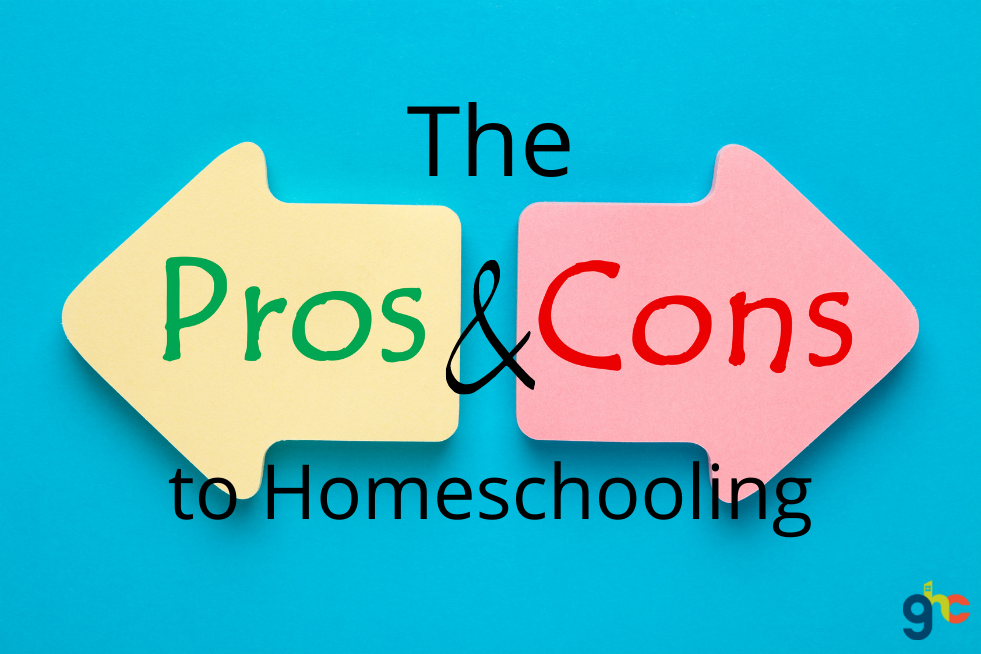Homeschooling is an amazing journey that is often embarked upon in anticipation of grandeur and accomplishment. Then, a few years in, and after countless days of wanting to throw in the towel, you might wonder what in the world you were thinking! In reality, ups and downs are simply part of life, and homeschooling is a way of life. Some people say it balances out over time, but I think a true assessment of the situation is clear that the pros far outweigh the cons, every time. Of course, there will be bad days, bad curriculum choices, sick days, and days you or your child just feel lazy. But isn’t that just like real life?
It’s little facts like this that sometimes get lost along the way in the pros and cons to homeschooling. At some point, someone decided to make it look as if you had bad days (or bad weeks), then you must have failed somehow. That simply isn’t true. Yes, there are pros and cons to homeschooling, and we’ll go over a few here. But chances are, you have your own list. And if you do, you’ll understand. Otherwise, let’s take a look at what we can really expect.
Be careful not to get so caught up in all the little failures that you wind up missing the accomplishments that are going on all around you.

What are the pros to homeschooling?
There really are many pros of homeschooling that you will want to consider. I've listed several of them here, but please don't consider this list as exhaustive. Pros to homeschooling often vary by family, depending on the needs of the homeschool family. I think you'll agree though, that these are some of the main benefits of homeschooling.
A Bond and Relationship With Your Children
Parents of children in the public school system get to spend time with their children in the evenings and on weekends. Even then, you’ll have to take your place in line as you watch your child trying to manage his or her own time. Homework, chores, meals, and catching up with friends can take a chunk of the time you’d hoped they would have for you. And that’s life with a public-school child.
However, a homeschooled child is with you all day. Not only are you there for teaching their lessons and helping them through new ideas and concepts, but you’re there for a lot of time to have a conversation and simply being. If something is bothering them, they don’t have to wait hours until they get home finally to unload their heavy burden, they can do it on their own time, at their own pace. At the same time, there is no long wait to reveal exciting news, either. The bonding that can take place in moments like these is immense and creates a lifetime relationship you’ll never grow tired of.
You Know the Morals and Values Your Own Children Are Taught
One of the most pressing problems for Christian home educators in today’s world is the extreme lack of moral compass in the public and private school systems. Bullying, aberrant sex education for preschoolers, the normalization of homosexual relationships, and Islam being taught in class, right alongside reading, writing, and arithmetic are very concerning for Christian parents around the nation. You never know when the next “big thing” will come along, being passed off as “normal” to our children who are too young to understand the implications. And these things are being taught covertly, without parental knowledge or consent.
These are actually some of the reasons parents choose to homeschool in the first place. When you teach your child at home, as a Christian, you can help guide them morally and ethically as well as academically. This pays off not only by putting your child ahead in academics but also helps to create a strong, morally sound individual who isn’t tainted by secular lies. Other changes that can be apparent in the homeschooled child are more compassion, empathy, kindness, and politeness.
A More Comprehensive Education
Not every homeschooling parent is completely absorbed with letter or point grades. However, the fact that homeschooled students score higher, across the board, is a fact. It could be that a majority of homeschoolers reject the Common Core element, or it could be the fact that one-on-one, personalized instruction is the “norm” for these children. Whatever it is, it cannot be denied that even colleges are beginning to speak up about the positive differences seen in homeschooled children and the child's education.
Flexibility
There are many ways that flexibility comes into play in your homeschool. First, there’s great flexibility in your curriculum options. By now, you’ve probably already assessed your child’s learning style and planned on a particular teaching style to go along with that. Now, you can feel free to either choose either a whole prepackaged homeschool curriculum that caters to both or, if you are taking a more relaxed or eclectic approach, you can assemble a homeschool curriculum that truly works for the personalized level on which you’re working.
You’ll also have extensive flexibility in your schedule as well, which can make homeschooling SO much less stressful. A flexible schedule, for some, can mean sleeping in an extra hour or so and homeschooling later in the day, or it can mean teaching several lessons outdoors, at the park, or even sitting in the doctor’s office. A flexible schedule means your child understands that learning can happen anywhere, at any time, with or without a typical classroom structure. In fact, this is the best way to learn, and you’ll see the benefits as your child blossoms when you set your own schedule.
More Productivity and Free Time
Since you don’t have to wait on thirty to forty other rambunctious children to settle down so that lessons can actually be completed, you’ll find that classwork can be completed in what feels like record time. There are no lunchroom or bathroom lines, no goofing off, and no preoccupation with electronics that steal time from the whole class. Instead, both you and your child get the benefit of a focused lesson that can be better explained and more easily absorbed.
What are the cons of homeschooling?
These may or may not be cons of homeschooling for every family that chooses to homeschool, but to the world at large, these suggestions do seem suspicious. If you’ve never been asked, “How in the world can you stand that?” or “Doesn’t that just drive you crazy?”, then I ask, are you really homeschooling?! Here are a few of the disadvantages of homeschooling to consider.
You Can Forget a Perfectly Clean House
Don’t get me wrong, there will be times when certain spaces in your home look pretty good. But if you homeschool, and more importantly, if you homeschool multiple children, you’re likely to understand that living in a constant state of “not perfect” will be the new normal. Of course, you won’t let your house get dirty, but you’ll find laundry doesn’t always get put in the dryer right away, dishes may be stacked and left for a bit of time, and you might not mop up those muddy footprints so quickly. You learn to manage the mess and you learn what you must attend to and what you can let go of, for now, knowing that your children's education comes first. And that’s okay!
Incidentally, “neat, clean, and orderly” are virtues and skills that can be worked into your curriculum. Even though your children aren’t to be treated simply as “domestic help”, you are preparing them for life in the real world. All too soon they will be going off to college and/or establishing their own household and these are things they need to know.
Homeschooling Requires a Great Amount of Time
For some, this is no problem at all, while others do suffer a little in the process of homeschooling. If you’re not teaching, you’re planning. If you’re not planning, you’re researching. If you’re not researching, you’re assembling lesson plans. The cycle is never completed, and the feeling of having less time is real. There’s also the fact that some teaching styles can require a great deal of preplanning, long before the actual instruction starts. It can be a huge responsibility and there are no substitute teachers to take over for sick days, doctor’s appointments, car trouble, or any one of a million things that could happen to frustrate your valuable time.
The time you spend homeschooling - and everything that goes with it - can also mean your home will become a one-income home. For some, this doesn’t change anything, as you’ve always been that way. On the other hand, giving up a career to homeschool is a decision many families make, and never regret it. Priorities! Values! To those on the outside, though, it can seem very unnecessary and peer pressure can be great at times, by your friends and family members.
As with every other aspect of homeschooling, however, you learn to give and take. You do what you can and move on. You can take up the slack down the road somewhere, so remember to be kind to yourself. Your job is massive… and important!
Fear of “Grade Levels” and “Falling Behind”
The idea of comparing your child to other same-age peers is one that is deeply ingrained in the traditional school system. And it’s a mindset that can often follow you into your homeschooling routine if you’re not careful, especially if this is your first year as a home educator. It’s true that standardized testing is necessary for some states, which only adds to this fear, but try not to let it consume you as you plan your year. Remember, you're teaching to mastery of the ideas taught for your own children, not comparing your children to others around you. This is the learning environment that you want to encourage.
The reality is this: homeschooled children often outperform their same-age peers quickly. In fact, if you’re not careful, you’ll wind up holding your child back to avoid finishing an entire curriculum long before the actual school year is over. This is often a problem that parents of gifted children face, and in that situation, careful planning is often necessary.
You Won’t Always Have a Personal Support Team
Of course, your husband is (sometimes) great support, as some other family members may be, as well. If you belong to a co-op, support group, or another homeschooling group, you’ll likely get support from them when you meet together. However, there are two ways in which a lack of support can attack. First, there are far more naysayers and busybodies than there should be. You’ll likely be questioned about a lot of things (socialization seems to be one of the favorites of those on the outside), especially if you are “in public” during school hours. Secondly, you are one homeschool teacher that also wears the hat of a principal, counselor, lunch lady, nurse, and organizer, just to name a few! If something is going to happen in your homeschool, there’s no one to consult. You have to make it happen. And so you soon learn to be all those things in one, every day.

In Closing
Of course, as mentioned above, there are many pros and cons to homeschooling, and I’m sure some have been left out of this list. My hope is that, with the ones we focused on here, you’ll see that, just as with life in general, there is a normal ebb and flow to homeschooling. Not everything is perfect, but neither is everything imperfect.
You’ll find what works best for you, your child, and your family. It may take a while to find it, but find it, you will. And when you do, all the effort put into finding it will be worthwhile. The crazy days will feel a little further away and, before long, you will begin to see your years of work paying off as your child nears graduation. The struggles will make you stronger.
